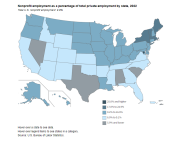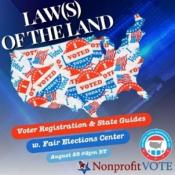Free Webinar
Accessing Remaining Covid Funds Before It’s Too Late

More than $86 billion available to charitable nonprofits and others are sitting in the coffers of state and local governments that must be spent or committed by the end of this year or the money is lost. This webinar, hosted by The NonProfit Times and featuring experts from the National Council of Nonprofits, is dedicated to ensuring nonprofits know about the availability of these dollars and how to access them before it’s too late.
Wednesday, August 28, 2:00 pm Eastern
The Coming Tax Debate
Removing Tax Code Impediments to Volunteering
A unique feature of the charitable sector is its ability to tap into the devotion of legions of dedicated volunteers to address community needs and challenges. With services ranging from board membership and hospital supports to meal deliveries and community clean-up projects, and much more, volunteers help charitable nonprofits advance their missions and strengthen communities. Many nonprofits facing increases in demand for services, staff shortages, and drops in revenue sources turn to volunteers to support their missions and create a meaningful experience for them. However, volunteer rates are declining. There are many barriers to volunteering, such as costs, that nonprofits cannot address alone. Federal tax policy actually discourages volunteerism in significant ways that must be redressed to reverse the trends in volunteering.
Worth Reading
- America should make it easier for young people to serve their country, editorial, Washington Post, July 12, 2024.
Federal FastView
- ERTC Voluntary Disclosure Program Reopened for Limited Time: Employers that submitted bogus or questionable claims under the Employee Retention Tax Credit (ERTC) have a new window of opportunity – until November 22 – to come into compliance, get a discount on repayments, and avoid future penalties, the IRS announced. The Internal Revenue Service urged employers with claims that show warning sign indicators to review eligibility requirements and talk to a trusted tax professional to see if the disclosure program is a good option for them. Learn more.
- Changes to the Head Start Program: The Department of Health and Human Services (HHS) issued a final rule on Head Start that will set an annual salary increase of $10,000 for most educators under the program. It also provides more flexibility on benefits for staff, wage, and benefit requirements to address workforce shortages and improve the quality of programming for children and families. Mental health is also a priority, allowing for more support for staff and integration of support across program services.
- Employer-Matching Contributions for Student Loan Payments: Nonprofit and other employers that sponsor retirement plans will be permitted to provide matching contributions for employees based on their payments on student loans, according to a recent Internal Revenue Service notice. Eligible retirement plans include 401(k), 403(b), governmental 457(b), or SIMPLE IRA plans. Previously, these benefits were restricted to only elective contributions to retirement plans. The notice applies to plan years that start after Dec. 31, 2024.
- Ban on Noncompete Agreements Blocked: The Federal Trade Commission (FTC) lacked the authority to impose a broad rule prohibiting noncompete clauses in most instances, a federal judge in Texas ruled as she blocked the rule from going into effect. The FTC rule, issued in May and set to go into effect in September, would have banned agreements commonly signed by employees not to go to work for their rivals or to launch competing businesses. Some arts groups had expressed concern about the scope of the restrictions on performances in geographic areas. The ruling in Texas is in conflict with the decision of a federal judge in Philadelphia, indicating that the ban may be appealed by the FTC.
- Deafblind Data Act: The Census Bureau would be required to expand collection of information on deaf and blind people on the American Community Survey, under bipartisan legislation introduced in the House this summer. The Bureau currently does not collect data on individuals who experience both hearing and vision loss; the bill would require the Bureau to report by 2026 on the feasibility of publishing a table of data on those respondents, including the sex, race, age, employment status, educational attainment, earnings, and poverty status. “Without a comprehensive national picture of this population, individuals who are deafblind may not receive the supports necessary to access information, communicate effectively, and better their social and emotional well-being,” according to the legislation.
Worth Studying
On the Employee Retention Tax Credit
- Safeguard Against Uncertainty When Claiming Employee Retention Credits, CLA, Aug. 20, 2024.
On nonprofits and natural disasters
- Disaster Resilience Is a State-Federal Balancing Act (8:22), National Conference of State Legislatures, Aug. 13, 2024.
- Natural Disaster Tax Relief, National Council of Nonprofits, Aug. 12, 2024.
Election Tip
Online Voter Registration
For most people across the country, online voter registration is the easiest way to check your status and register to vote on Election Day. Hear tips for voters to access online registration and for nonprofits to get involved in sharing registration information from Mary Alice Scott, Public Affairs Manager at the Maine Association of Nonprofits.
Worth Reading
- A new movement aims to remake evangelicals’ relationship to politics, Michelle Boorstein, Washington Post, Aug. 4, 2024.
Addressing Workforce Shortages
The nonprofit workforce shortage may be more significant and have greater adverse impacts than in other segments of the economy, but it is not unique to the charitable sector. Fortunately, good ideas abound across the country and there are emerging approaches that could be adopted and expanded by nonprofit employers. According to the National Conference of State Legislatures, more than 20 states enacted legislation to address requirements/qualifications for public employees in 2023, either by changing degree requirements or increasing accessibility for people with disabilities. The Wisconsin Task Force on Healthcare Workforce recently released recommendations focused on education and training, recruitment and retention, and regulatory policy. Recommended solutions included reducing barriers to training, more funding for the state Worker Advancement Initiative Grant program, increasing access to dual enrollment programs, and more health care workforce wellness programming. Returning to the charitable sector, child care nonprofits in New Hampshire are supporting students who speak a language other than English to prepare to become providers, addressing some of the barriers prospective applicants face.
Worth Reading
- This preschool in Alaska changed lives for parents and kids alike. Why did it have to close?, Moriah Balingit, Associated Press, Aug. 5, 2024.
- Trends in Federal Policy on Child Care and Early Childhood Education, National Conference of State Legislatures, July 29, 2024.
Summer Special Legislative Sessions
- Colorado: Governor Polis has called a special emergency session this week to seek a compromise on property taxes in order to avoid two ballot initiatives in November that would significantly cut rates. After a property tax overhaul earlier this year, lawmakers are again considering permanently reducing property taxes. The two pending ballot initiatives, critics assert, would have a greater impact on the state budget and financing, potentially curbing new housing projects.
- Nebraska: A special session to address property tax increases resulted in a slimmed-down bill (LB 34) that automatically enrolls property owners in a tax credit program. It also caps local property tax revenue increases, determined by a formula of state and local spending increases. The final measure did not include the removal of up to 120 existing tax exemptions, including many sales tax exemptions that apply to nonprofits. Instead, lawmakers used a combination of budget cuts, cash fund transfers, increased fees, and state reserves to cover the costs. The Governor signed the legislation noting that it was only a “first step.”
- Utah: During a special session last week, lawmakers approved a measure for the November ballot asking voters to decide on a constitutional amendment giving legislators authority to alter voter-approved ballot measures. The proposed amendment is in response to a recent state Supreme Court ruling that lawmakers do not have the authority to change laws approved through citizen initiatives regarding redistricting.
Taxes, Fees, and PILOTs
Policymakers Imposing, Adjusting Costs on Nonprofits
Although charitable organizations are generally exempt from taxation, state and local governments regularly impose and adjust many taxes, fees, and Payments in Lieu of Taxes (PILOTs) affecting nonprofit operations:
- Fire Protection Fee: A new Delaware law authorizes counties to impose a fire protection fee on property that is otherwise tax exempt. Counties, however, would be permitted to exempt property from the fire protection fee.
- PILOTs: Holyoke, Pennsylvania has hired a consulting firm to explore ways the city can secure revenues from charitable nonprofits that own property that is exempt from taxation. The mayor is seeking a formal, written policy complete with talking points and a formula for establishing a PILOT payment schedule for the City’s tax-exempt properties. The firm hails from the Boston area, site of the most controversial PILOT program in the country.
- Remote Sales: Legislation signed by North Carolina Governor Cooper removes 200 transaction thresholds for remote sellers in the administration of sales taxes. The law also provides for the automatic extension of filing state income tax returns when the Internal Revenue Service grants an extension of the corresponding federal returns.
- Solicitation Registration Fee: A technical bill in Florida signed by the Governor provides an exemption for the solicitation registration fee based on total contributions during a fiscal year, removes a 180-day extension for financial filings, and clarifies that a street address is required and cannot be a post office box, virtual office, or mail drop.
Worth Quoting
On nonprofit workforce challenges
- “Demand and costs keep going up, and the workforce and dollars for nonprofits aren’t keeping up … that means people who need help aren’t getting help. As a community, we know that we can do better. We can choose to thrive as a community if we choose to act. If we invest as a community in our sector and in one another, then we can do so much good for so many.”
— Michael Corey, Executive Director of Human Service Chamber of Franklin County, in HSC, Members to Testify at Columbus City Council Hearing on State of Nonprofit Sector, Human Service Chamber of Franklin County, Aug. 15, 2024.
- “It’s a huge amount of employment, and yet we’re held to different standards…. Nonprofits focus on better futures for everyone. We care for unsheltered people and their pets. We care about clean air and water for our children and their families.”
— Jill Bennett, CEO of Utah Nonprofits Association, in Nonprofit overhead myths harm organizations’ ability to pay staff, Jack Dodson, Utah Business, Aug. 16, 2024.
Worth Studying
On nonprofit-government contracting
- Indiana Local Government Officials’ Contracting With Nonprofits, Kirsten Grønbjerg and Eric Schmidt, Indiana University O’Neill School of Public and Environmental Affairs and the Lilly Family School of Philanthropy at Indiana University Indianapolis, Aug. 13, 2024.
Numbers in the News
12.8 million

The number of nonprofit jobs in 2022, representing nearly ten percent (9.9%) of the private workforce. This is the first update since 2017 and the COVID-19 pandemic.
Source: Nonprofits accounted for 12.8 million jobs, 9.9 percent of private-sector employment, in 2022, Bureau of Labor Statistics, Aug. 16, 2024.
Did You Know?
The free federal COVID-19 testing program will return in the fall: households can order four tests once the application reopens. Learn more at covidtests.gov.
Nonprofit Events
- Aug. 27, Voter Engagement for Nonprofits, Minnesota Council of Nonprofits
- Aug. 27-28, Idaho Nonprofit Conference, Idaho Nonprofit Center
- Sept. 5, Legislative Candidate Forum, Nonprofit Association of the Midlands
- Sept. 5, Mastering Policy and Advocacy Communication, Nonprofit New York
- Sep. 14, Best Practices for Successful Voter Registration Drives, Tennessee Nonprofit Network
- Sept. 16-17, Conference for Louisiana’s Nonprofits, Louisiana Alliance for Nonprofits
- Sep. 18-19, Nonprofit Leadership Summit, West Virginia Nonprofit Association
- Sep. 19, Advocacy Hour, Nonprofit Association of Washington
Nonprofit VOTE Webinar
Law(s) of the Land: Voter Registration & State Guides

In the wake of the wave of post-2020 changes to voting laws in many states, nonprofits across the country have reported feeling somewhat uneasy about taking part in voter registration drives. Join this webinar designed to help address those concerns, answer your questions, go over the general rules for voter registration, and cover the library of guides for holding voter registration drives in every state.
Wednesday, August 28, 2:00 pm Eastern
Beyond the Slogans: Advancing Democracy With Purpose
Partisan political campaigns tend to co-opt perfectly legitimate terms and concepts for their own purposes. The recent national party conventions pitted “Freedom” versus “Make America Great Again.” But for the dripping partisan rhetoric they represent, the slogans could just as well appear on red, blue, purple, rainbow, or any other color bumper stickers representing the American spirit. We at the Advocacy in Action department haven’t changed our views with the times – we are as adamant as ever that nonprofit nonpartisanship is the path to a better, stronger, fairer America. To prove it, here is a late summer reading list of past articles dedicated to advancing democracy in America through nonpartisan engagement.
Stay in the Loop
Want to be the first to know policy developments and operational trends affecting nonprofits? Sign-up to receive our free newsletters, Nonprofit Champion and Nonprofit Essentials, and browse the archive of past editions.
Sign-up